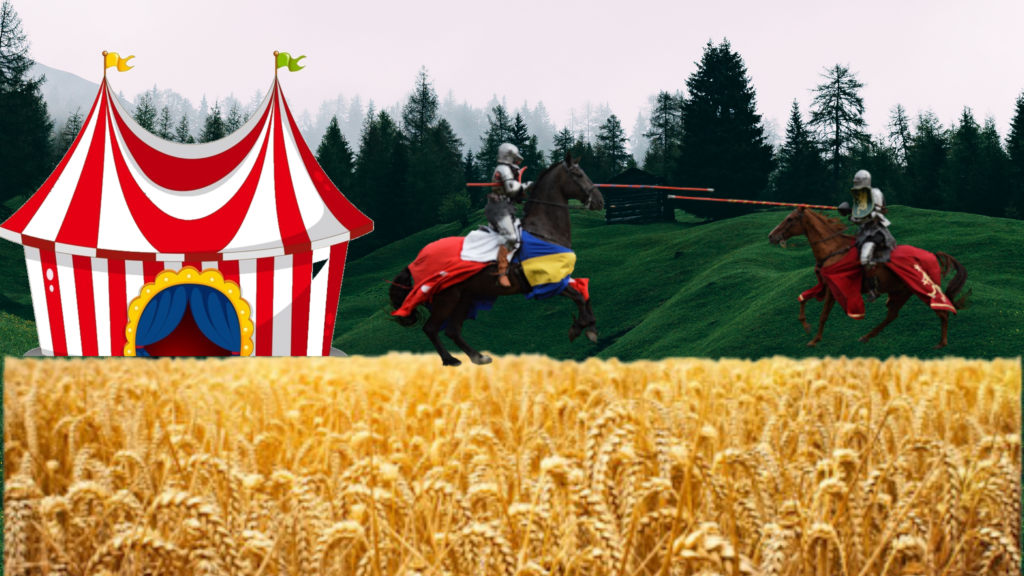Whether you’re the sort of person for whom the holiday season brings great delight, or the other sort that spends most of the year terrified of two weeks in December, holidays bring out certain characteristics in people that seem to be dormant at other times. Regardless, with the holidays fast approaching, I thought this would be a good time to discuss holidays in a campaign setting.
Scope and Scale
A holiday, or special occasion doesn’t have to be a massive event. We tend to conflate holidays with major events like Christmas, with weeks or months of build up and preparation, but they don’t need to be anywhere near that size.
A holiday in a tabletop RPG could be almost anything: A circus troupe comes to town for two days; a baron decides to celebrate his daughter’s birthday; a village commemorates its founding; a religious order celebrates an historic event; a parade is held in honour of the adventurers who saved the day; you get the idea.
The nature of the holiday is likely going to determine the scope of its celebrations. A village’s celebration will probably not go beyond that village, whereas something larger (like a religious celebration or a harvest festival) may be marked as a holiday in an entire region.

Similarly, the scale of celebrations can vary. People may commemorate a specific hour, such as sunrise or sunset on a particular day, marking it as significant or holy; or they may set aside one or more full days, devoting themselves to celebrating and setting aside any unnecessary work for the duration.
Celebrations may include parades, festivals, unique market vendors, feasts, religious celebrations and observances, seasonal hunting, tournaments, and much more.
Holidays for My Campaign
It’s worth noting that D&D (at least in Forgotten Realms) has a default system of holidays that can be found in the Dungeon Master’s Guide and the Sword Coast Adventurer’s Guide in the calendar section. I won’t go through these here, other than to point them out. I’ve previously referenced the calendar here, so you can check that out if you want to.
As with building anything in D&D, you can start almost anywhere and fill in the rest after. You might start with an occasion, let’s say the defeat of a red dragon by a group of adventurers. This is the sort of thing you might decide to do to reward your party for a job well done, and to build some reputation features into the game.
Once we have our occasion, we move to how the people would celebrate it. In this case there may be puppet shows re-enacting the defeat of the dragon. It may be burned or killed in effigy. Perhaps there’s even a large scale re-enactment with a mock village being destroyed ,and (if you’re a DM who enjoys having fun with your group), the fire gets out of control and catches the actual village on fire. Just a thought…I’m sure most of you are nicer than I am.
Alternately, you might start with the celebration itself. You really want to have a tournament. OK, start there. Why would there be a tournament? We need someone to sponsor it, so we could have a duke or baron celebrating a wedding, or an anniversary of their reign, or a major event in the region.
The important thing that I always want to stress about building anything in game is this: you don’t have to have it all done at once. Start somewhere and you can fill in the rest as you go.
Random Events
Sometimes you don’t even need an occasion. Sometimes things just happen.
Previously, I mentioned a circus, or a carnival. Now, you might decide that the circus comes every year at a certain time, but traveling entertainers, like a circus, travelling troubadours, wandering minstrel, crone with magic pies, or the like, may come along at random. A traveling troupe, for instance, might be travelling from one location to another and making stops along the way to earn a bit of coin or just to pay for their supper. A minstrel may be on their way somewhere, or they might be out spreading news for a noble, or promoting a new song, or looking for a patron to play for.
Have Fun with It
Don’t feel like you have to keep your event quiet and boring. In fact, I think special events like this are a great place to have a little extra fun with your group. Think about it this way: a large crowd of people has gathered together. That’s a perfect recipe for anything to happen. A villain could choose that moment to strike; children could go missing (a bit real but it’s your game); or a food fight could break out. It can be serious or hilarious, and that’s the nature of a holiday, in real life or in game.
Remember that not everything needs to be epic. You can toss a holiday into a game to give your players a break from the tensions of the regular game, or to introduce your next epic story element. Odds are that a day off of serious things will do more to mess with them than another seemingly impossible task.
Whatever you choose to do with it, remember, its a game. Go have fun with it!